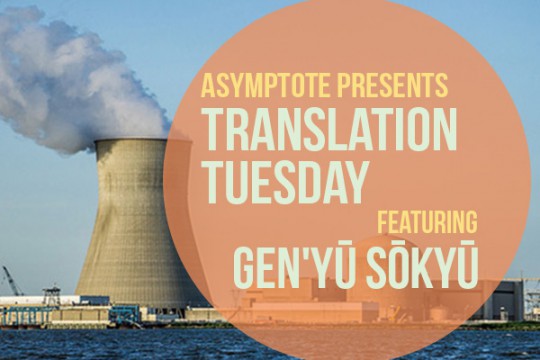Akutagawa Prize winner Gen’yū Sōkyū has an unusual vocation among litterateurs: he is the chief priest of a temple in Fukushima, where nuclear disaster struck following the earthquake and tsunami of March 2011. Both a leader and a major voice in reconstruction efforts, Gen’yū uses fiction to grapple with the catastrophe, and in this story, “Mountain of Light”, he imagines (perhaps even hopes for) a future of provincial ascendance and “Irradiation Tours”. In this excerpt, the narrator relates his coming to terms with his father’s devotion in collecting the community’s “irradiated”—their radiation-contaminated waste, in other words.
The next time I saw Dad was at Mom’s funeral. He himself would die three years later at ninety-five—twenty-five years after our last conversation—of old age, not cancer. After my mother’s cremation, he spoke to me.
“Your ma had a hard time of it, but it was all worthwhile. Thanks to the irradiated, we managed to live meaningfully, right up to the end, and that’s no joke. When my time comes . . . you’ll burn me on top of that mountain, right?”
His hearing wasn’t so good by that time, so while I said “Don’t be stupid,” apparently what he heard was “Okay, I’ll do it,” although I didn’t realise this until much later. He held my hands in front of Mom’s altar and said “Thank you” over and over again . . . It might’ve been a misunderstanding, but that was the first time he had ever shown me gratitude.
My brother and sister-in-law had only offered incense at the crematorium, and were no longer there. He was a consultant to an electronics manufacturer, and even though he said he had a meeting to attend, I was sure they had left out of fear. I too had debates with the missus about the effects of low-level exposure, almost every night. Eventually we stopped speaking, and came to see each other as “contaminated.” We’d separated by then. And that’s when I finally realised that we were both being completely ridiculous. READ MORE…

